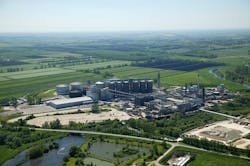British Sugar’s “Factories of the Future” Initiative Includes a Private 4G Network
As the use of mobile technologies such as augmented reality and autonomous mobile robots in manufacturing continues to grow, wireless connectivity on the plant floor is fast becoming an imperative. In addition to making non-fixed automation possible, wireless networks also allow end users to integrate data more easily from large quantities of connected devices spread over a wide area.
However, traditional Wi-Fi may lack the efficiency, security, and control that mission-critical operations require. For instance, in legacy environments that were not designed with wireless connectivity in mind, fluctuations in temperature, humidity, moisture, and vibration, machines that give off an electrostatic charge, and even the placement of metal or glass walls may interfere with the transmission of reliable wireless signals. High device density may also compromise reliability in settings where hundreds or even thousands of sensors may need to be connected to the network. Moreover, the limited range of Wi-Fi may not be suitable for the scale of many industrial operations.
As a result, many manufacturers are turning to private cellular networks—some of which employ 5G—to provide connectivity in their facilities. One such example is British Sugar, which has recently partnered with telecommunications company Virgin Media 02 Business and Nokia to roll out a 4G private cellular network across multiple factory sites spanning a large geographical area. The network is being adopted in conjunction with British Sugar’s “Factories of The Future” upgrade initiative.
According to British Sugar, the new network will allow them to more effectively introduce new technologies such as artificial intelligence (AI), automated production lines, robots, and drones. AI will be used to monitor factory operations in real-time and predict maintenance and potential downtime in advance, reducing waste and downtime and cutting costs. Going forward, the company plans to further embrace Industry 4.0 through a planned seven-year partnership with Virgin Media 02 Business and Nokia. Currently, more than 15 digital manufacturing use cases have been planned for British Sugar’s 4G network, which has been designed to be easily upgradable to 5G.
“During testing we were encouraged by the early results seen and as we have begun to roll out the targeted priority use cases to our users; they have been quick to give feedback about the time savings they have seen—with new plant commissioning, plant testing and day-to-day diagnostic processes being highlighted in particular,” said Nick Smalley, program manager at British Sugar.
Cellular networks—whether 4G or 5G—have several advantages over Wi-Fi for operators of expansive industrial facilities. For one, they provide broader coverage with fewer access points, granting end users the network range they need. Beyond that, they have a higher end-device capacity, meaning that the integration of many connected devices will not interfere with reliability. Finally, cellular networks have built-in encryption, and require that end-devices have a SIM (subscriber identification module) card to connect, which limits points of entry and bolsters cybersecurity.
While these benefits can be attained from a public cellular network, a dedicated private network tailored specifically to British Sugar’s operational needs can provide better coverage and more reliable performance, since it does not require its bandwidth be shared with others. Furthermore, it allows the company to maintain internal control of its confidential data.

